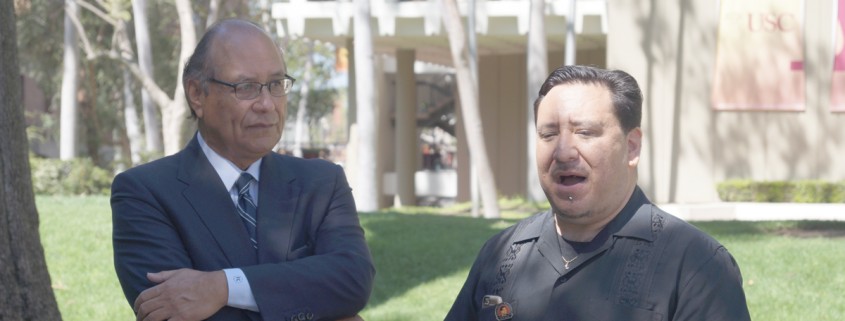Cesar Chavez’s son discusses his father’s legacy
The plaque dedicated to Cesar Chavez, National Farm Workers Association founder and workers’ rights advocate, has occupied its current position on campus, a strip of grass between Bovard Auditorium and Taper Hall, since 1998. On Friday, the labor leader’s eldest son Fernando Chavez saw the memorial to his father for the first time during a visit to USC, in which he discussed activism, social justice and the legacy of his father’s campaign.
Fernando Chavez, a civil rights activist and immigration lawyer, came to USC the day after Cesar Chavez’ birthday in an event hosted by El Centro Chicano as part of its Power Pan Dulce speaker series. He began by describing how, since his last visit to the University in the late 1980s, much has changed about the campus – most notably its racial and ethnic makeup, which has grown increasingly diverse. However, he also stressed that work remains to be done to achieve equality for Latinos in education.
“When I walked on this campus today, I was surprised at the diversity in the faces I saw,” Fernando Chavez said. “I think nevertheless that after so many years, those numbers need to go up. When you look at a city where over 50 percent of the population is Latino, you cannot have 12 percent Latinos in education.”
The concept of education as a tool for progress, Fernando Chavez said, was important to his father, who never went to high school but read every book that he could get his hands on. Cesar Chavez led thousands of field workers in the 1960s and 1970s to demand benefits such as unemployment insurance by creating a union and organizing a boycott of grape growers. Cesar Chavez felt that his relative lack of schooling put him at a disadvantage when standing up to the agriculture industry, which historically took advantage of immigrant laborers by paying low wages with long working hours and poor working conditions.
“He took that industry on with nothing more than an eighth grade education and a belief that workers had a right to have dignity and respect,” Fernando Chavez said. “That was all he had.”
What allowed Cesar Chavez to keep going despite the difficulty was an attitude of relentlessness, a lesson that Fernando Chavez said his father embodied and passed on to his children. Fernando Chavez recounted one of his earliest memories of his father’s activism, in which he refused to give up on holding community meetings despite the fact that no one attended. Eventually, he was able to mobilize a boycott that led to substantial improvements in working conditions, but achieving this outcome took time and determination, according to Fernando Chavez.
“That lesson has never failed me, because it taught me the importance of being relentless in whatever you want to do,” Fernando Chavez said. “It’s a trait that is powerful for whatever you want to do in life – whether you want to be a CEO of a corporation, a community organizer, a physician. That concept is one that can assist all of us in our daily lives.”
The idea of relentlessness drives many student groups who are trying to change the status quo for minorities in the present day, according to William Vela, the director of El Centro Chicano. Although progress has been made in addressing issues of discrimination on campus through legislation such as last semester’s Campus Climate Resolution, Vela said, students should look to Cesar Chavez’ activism as a model for community organizing if they want to continue the momentum.
“I’m happy that the University has acknowledged [the campus climate issue] and is moving forward, but remember where that came from – it came from students,” Vela said. “It came from activism, it came from many of the principles that Fernando and his father and his family have. I think this is a great opportunity to discuss how can we move forward, what more is there to accomplish, and how can we do that together as a familia and as a Trojan Familia.”
Correction: A previous version of this article stated that the plaque dedicated to Cesar Chavez has been on campus since 1996. It was dedicated in 1998. The Daily Trojan regrets the error.

